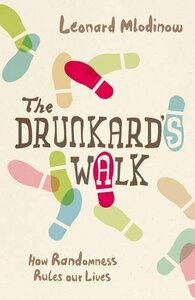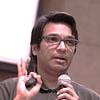You need to sign in or sign up before continuing.
Take a photo of a barcode or cover
"In the scientific study of random processes the drunkard’s walk is the archetype. In our lives it also provides an apt model, for like the granules of pollen floating in the Brownian fluid, we’re continually nudged in this direction and then that one by random events. As a result, although statistical regularities can be found in social data, the future of particular individuals is impossible to predict, and for our particular achievements, our jobs, our friends, our finances, we all owe more to chance than many people realize."
Alongside Taleb's Black Swan and Fooled by Randomness, and books by Kahneman and other behavioral economists, The Drunkard's Walk succinctly puts for a very convincing argument that, as Max Born put it - “Chance is a more fundamental conception than causality.”
No matter what you think or think you believe, there is so much randomness in everyday life to state with even small degrees of certainty that one can predict the outcome of a game, the stock market and even whether you'll get the best-employee-of-the-year award.
The book makes things surprisingly clear by using probability theories and statistics to state that randomness governs our lives and we are more helpless in steering our paths than we'd like to believe.
Alongside Taleb's Black Swan and Fooled by Randomness, and books by Kahneman and other behavioral economists, The Drunkard's Walk succinctly puts for a very convincing argument that, as Max Born put it - “Chance is a more fundamental conception than causality.”
No matter what you think or think you believe, there is so much randomness in everyday life to state with even small degrees of certainty that one can predict the outcome of a game, the stock market and even whether you'll get the best-employee-of-the-year award.
The book makes things surprisingly clear by using probability theories and statistics to state that randomness governs our lives and we are more helpless in steering our paths than we'd like to believe.
informative
reflective
fast-paced
Combining aesthetic humour with astute wit, Leonard Mlodinow regales the reader with a fantastic perspective on the randomness surrounding the human existence. He also serves up a beginner's guide to fascinating theories of probability. An engrossing read.
This is a very fun, entertaining book about the myriad ways in which random phenomena affect our lives. There is nothing really new here. As a physicist, I am already well familiar will all of the concepts introduced, concerning probability and statistics. But oh--what a variety of fascinating applications!
I love the story about the "Ask Marilyn" column in Parade Magazine. Marilyn vos Savant holds the record for the world's highest IQ. She discussed the famous "Monty Hall" problem, and got aggravated letters from 10,000 readers, including 1,000 PhD's (many mathematicians!) who claimed her analysis was wrong. Nevertheless, she was absolutely correct--people just do not have a firm grasp of probability concepts.
The book explains lots of interesting puzzles and paradoxes. For me, the best part of the book is the discussion of how statistically random events conspire to make "outliers". This comes up again and again, in understanding "genius" mutual fund managers and fast-growing mega-companies.
My only disappointment, is the book's emphasis on the so-called "normal" (Gaussian) distribution, to the exclusion of other distributions. Many economic and natural environmental events are outliers that deviate from the normal distribution, as described so well in Benoit Mandelbrot's [b:The (Mis)Behavior of Markets|665134|The (Mis)Behavior of Markets|Benoît B. Mandelbrot|http://photo.goodreads.com/books/1176918291s/665134.jpg|651192].
I love the story about the "Ask Marilyn" column in Parade Magazine. Marilyn vos Savant holds the record for the world's highest IQ. She discussed the famous "Monty Hall" problem, and got aggravated letters from 10,000 readers, including 1,000 PhD's (many mathematicians!) who claimed her analysis was wrong. Nevertheless, she was absolutely correct--people just do not have a firm grasp of probability concepts.
The book explains lots of interesting puzzles and paradoxes. For me, the best part of the book is the discussion of how statistically random events conspire to make "outliers". This comes up again and again, in understanding "genius" mutual fund managers and fast-growing mega-companies.
My only disappointment, is the book's emphasis on the so-called "normal" (Gaussian) distribution, to the exclusion of other distributions. Many economic and natural environmental events are outliers that deviate from the normal distribution, as described so well in Benoit Mandelbrot's [b:The (Mis)Behavior of Markets|665134|The (Mis)Behavior of Markets|Benoît B. Mandelbrot|http://photo.goodreads.com/books/1176918291s/665134.jpg|651192].
challenging
informative
medium-paced
4 stars, because:
a) it finally explained the Monty Hall problem in a way that I could understand, especially after my previous experience was reading that Metafilter thread that doomed my understanding for years.
b) it gave me an idea for a Christmas present for my dad (this very book!) who is not an easy person to shop for.
In any case, it's interesting, provided you have a small tolerance for math.
a) it finally explained the Monty Hall problem in a way that I could understand, especially after my previous experience was reading that Metafilter thread that doomed my understanding for years.
b) it gave me an idea for a Christmas present for my dad (this very book!) who is not an easy person to shop for.
In any case, it's interesting, provided you have a small tolerance for math.
informative
slow-paced
This was ultimately one of those frustrating experiences where you find yourself reading a book that (1) is about a topic you're already familiar with, and (2) perfectly agrees with the views you held on the topic before you began. That said, it was an enjoyable book and I think every single person in the world should read it!
Ok, I'm weird and the one of my favorite types of math has always been probability and statistics. So, this book was just a lot of fun to read.[return][return]I can't give it 5 stars for one reason. In one of the first chapters, the author describes a situation that is supposed to explain how even doctors make mistakes understanding probability. Looking up the actual article he references, he's right. But the way he words the problem in the book makes the doctors *possibly* correct. It bothered me enough to look up the article and to check with a friend of mine who's in the process of getting a math-related PhD.[return][return]It was really just sloppy wording, but I almost didn't bother reading the rest of the book because I was worried there'd be the same type of slip-up over and over again. AFAIK, there wasn't, though.[return][return]It drives me crazy when people can't seem to understand elementary stats and probability. I wish this book could be required reading for high school math!
Great anecdotes and crisp writing, but the book, at times, stumbles along.



